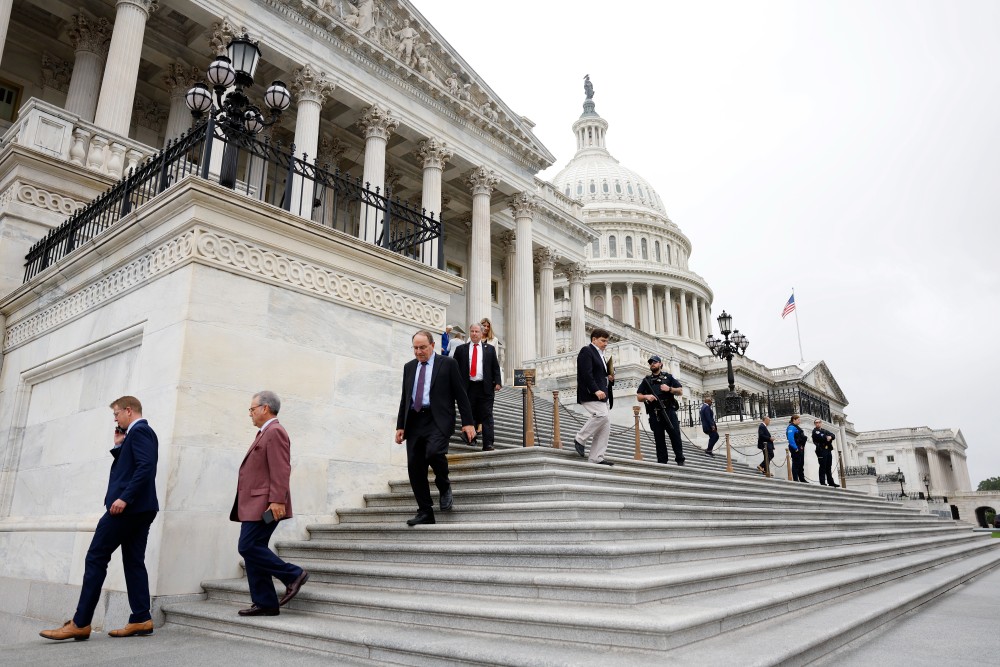
By Kate Scanlon
WASHINGTON (OSV News) — Congress on Sept. 25 passed a temporary measure to keep the federal government funded into December, averting a shutdown before the Nov. 5 election.
The Senate approved the measure in a 78-18 vote shortly after the House approved the measure, a deal struck to avoid a pre-election government shutdown. The bill funded most agencies at their current levels through Dec. 20, but it granted an additional $231 million boost to the Secret Service as that agency bolsters its efforts following two assassination attempts against former President Donald Trump, the Republican presidential nominee.
The bill will be sent to President Joe Biden’s desk and he is expected to sign it into law.
Eighty-two Republicans voted against the bill, as Trump urged them to reject the measure over his call for adding new proof-of-citizenship requirements on voter registration, known as the SAVE Act.
Getting the funding bill passed was a lengthy process for House Republican leadership, as the previous week, the House rejected a $1.6 trillion stopgap spending bill to fund the government into March including the SAVE Act, as a group of Republicans joined Democrats to derail the proposal by House Speaker Mike Johnson, R-La. The funding legislation was rejected or pulled several times amid internal party divisions over whether to pass a continuing resolution or what should be in it.
But combining the funding legislation with the SAVE Act would have been rejected by the Democratic-controlled Senate, and Senate Republicans expressed concern that a government shutdown shortly before the election would harm their party’s chances in November.
Trump previously urged Republicans to shut down the government unless the bill included the SAVE Act.
“If Republicans don’t get the SAVE Act, and every ounce of it, they should not agree to a Continuing Resolution in any way, shape, or form,” Trump wrote on his social media platform Truth Social on Sept. 18.
Catholic advocacy groups, including the U.S. bishops’ conference, have generally cautioned against government shutdowns, urging lawmakers to come to an agreement and keep the government open, citing their concern about how a government shutdown could impact the poor and vulnerable, as well as ministry to U.S. military personnel.
A government shutdown occurs when Congress fails to pass some form of budget legislation, or if such legislation is not signed into law by the president. Some types of essential government services are exempt, including Social Security payments to seniors. But many other functions of government are suspended amid shutdowns, such as paychecks for government workers, including members of the armed services. Such shutdowns can also impact the Special Supplemental Nutrition Program for Women, Infants and Children program, or WIC, which helps low-income families buy items such as fruits and vegetables, depending on the length of the shutdown.
Georgia Machell, president & CEO of the National WIC Association, said in a Sept. 25 statement, “We are pleased that Congress came together in bipartisan fashion to continue government funding for the next few months. For WIC participants, this means peace of mind through fall that the essential benefits and access to health services WIC provides will continue uninterrupted.”
“However, there is no substitute for Congress meeting its primary responsibility: providing full funding for WIC through the remainder of the new fiscal year,” Machell said. “Appropriators should begin their essential work now on crafting a funding agreement that provides WIC families and staff with the long-term certainty they need and deserve. We have seen in recent years how even the threat of reduced funding can cause needless turmoil for WIC families. Congress has more than enough time to avoid repeating such a scenario, and we urge members to use that time wisely.”
The bill funds the government through Dec. 20, punting funding debates until after the election.
